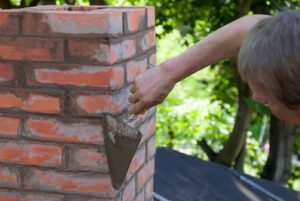You’ll prepare, lay, and repair masonry units as a brick mason. Your work will often require various masonry materials, such as stone, concrete blocks, and structural tile. In addition, you may need to install castable materials in commercial vessels and fire brick. As a brick mason, you’ll be able to expand your skillset by learning to install specialized masonry units. As a bonus, this industry is also an excellent choice for those who love creativity.
A brick Masonry Charleston SC uses various hand tools to build and repair structures. They may also need to use caulking materials to correct mortar joints. A brick mason may also install high-heat materials like glass or tile. Additionally, brick masons may refurbish walls, chimneys, and floors. A brick mason must be physically fit to perform the job, as their job may require climbing ladders and scaffolding. They must also be familiar with safety regulations to protect themselves and others.
Before starting work, aspiring brick masons should have a high school diploma or equivalent and previous professional experience. They must also have the ability to lift heavy equipment. They should have a steady pace and apply layers of mortar smoothly. They should also have the creativity to shape and form stones to create attractive structures. The ability to follow safety policies and procedure manuals is essential for bricklayers. The benefits of this career are numerous. So, what’s holding you back?
There are many kinds of bricks to choose from. A brick mason can use various types of bricks, including clay, terra-cotta, stone, concrete, blocks, tiles, and more. Bricks come in many shapes and colors. You can choose from a wide selection of bricks, including channel, hollow, cownose, and bullnose. And if you’re looking for a unique brick design, you can hire a brick mason who specializes in repointing.
A brick mason will usually start their work at a corner of a structure. Corners are tricky and require precision. After creating the bed of mortar, they’ll place brick on it. If needed, they’ll need to cut the bricks to fit around an opening. Jointing tools are used to finish brickwork and repair high-temperature equipment. This job is highly demanding, but the pay is great. The rewards are substantial and you’ll be proud of your work for years to come.
In addition to apprenticeship programs, brick masons must have a high school education. To become a brick mason, you need to complete a licensed apprenticeship program. Many unions and contractor associations sponsor apprenticeship programs. You should contact your local union to learn more about the programs. You can also complete a one-year technical college program as a substitute for an apprenticeship. As a bonus, any credits you earn in these programs will count toward your associate’s degree.
To become a brick mason, you need a high school diploma and the physical ability to perform the job. Depending on the state that you live in, you may need to complete an apprenticeship program. Apprenticeships typically last for three or four years and will train you to become a brick mason. Most apprenticeship programs are sponsored by unions or employers, and provide a living wage. In addition to the apprenticeship, you’ll also need to complete an eight-stage training program that includes four32 hours of classroom work and more than 6,000 hours of on-the-job training.
In general, brick masons and apprentices share many responsibilities. However, Brick Masons and refractory bricklayers have slightly different job descriptions, with the former typically having responsibilities like heavy equipment, construction sites, and structural tiles. Apprentices need to learn about safety protocols and mix materials to ensure they’re using them safely. The pay scale for brick masons is similar to that of brick masons, with a median salary of $53,100.
To become a brick mason, you should have experience in working with masonry materials. You must be able to read construction plans and interpret blueprints. Brick masons can construct a variety of buildings and structures. A brick mason reads blueprints and plans and calculates materials for each job. A brick mason will lay out a structure, cut the materials to size, and use measuring tools, such as stakes, rules, and levels.
As a brick mason, you’ll be responsible for creating aesthetically pleasing surfaces and structures. You’ll build and repair residential and commercial walls, as well as patios, fireplaces, and other interior structures. Additionally, you’ll also be responsible for polishing masonry materials. In this field, you’ll be working with a variety of bricks, stones, and structural stone blocks to make beautiful, sturdy structures. A brick mason will need to be able to follow a blueprint and follow instructions to build a structure perfectly.
